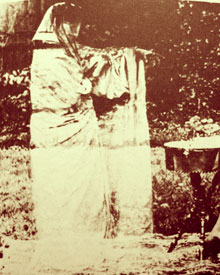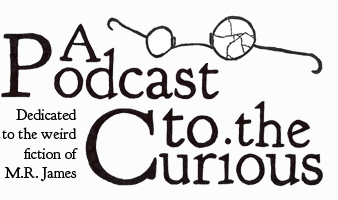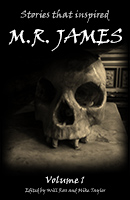 Mike is off on his honeymoon at the moment, so in lieu of a full episode Will provides a reading of and short commentary on an M.R. James essay ‘Ghosts – Treat them Gently!‘ which was originally published in the Evening News on 17 April 1931.
Mike is off on his honeymoon at the moment, so in lieu of a full episode Will provides a reading of and short commentary on an M.R. James essay ‘Ghosts – Treat them Gently!‘ which was originally published in the Evening News on 17 April 1931.
In the essay Monty talks about what ingredients he thinks go to make up a really successful ghost story, and gives an insight into the supernatural fiction he rates most highly.
Links
- The ‘Not at Night’ series
- Society for Psychical Research
- Mr Wardle’s Fat Boy
- Sheridan Le Fanu
- William Harrison Ainsworth
- The Lancashire Witches (Novel by above)
- E.F Benson
- Algernon Blackwood
- A. M. Burrage
- Walter de la Mare
- H. Russell Wakefield
- Margaret Oliphant
- Lanoe Falconer
Podcast: Play in new window | Download
Subscribe: RSS
Tags: A.M. Burrage, Algernon Blackwood, E.F Benson, Evening News, Ghost Stories, Ghosts - Treat them Gently, H. Russell Wakefield, Lancashire Witches, Lanoe Falconer, M.R. James, Margaret Oliphant, Montague Rhodes James, Mr Wardle's Fat Boy, Not at Night, Sheridan le Fanu, Society for Psychical Research, Walter de la Mere, William Harrison Ainsworth








A fine little essay by James here, a nice little insight into what he thought was scary or effective, ghost-wise, very well read by Will – I hope to hear more of these n the future!
James clearly wasn’t a fan of the pulps (he wrote some rather scathing remarks about H.P. Lovecraft: ‘He uses the word cosmic no less than 24 times’), but I couldn’t see James really digging them at all. Whereas he’s dead right about some of them essentially being shock for shock’s sake, lurid and overly descriptive of sex or violence when atmosphere is what you want to build instead of direct titillation to keep the readers interested, not all of the pulps were terrible – after all, Lovecraft has pretty much gone on to be more successful than James (although I wouldn’t mind seeing a Jamesian pen and paper RPG).
James was that almost quintessential Victorian gentleman scholar, and loathed any obscenity or – God forbid – hint of sexuality in his entertainment. I am partly able to agree with him, a lot of the time violence and sex isn’t necessary and should only be used if the scene calls for it, not to just throw in – but it can by all rights exist, they are both natural to us all.
To go on and on about the parallels between James and HPL, HPL’s world seems a lot noisier than James’, with Arkham, Dunwich, Innsmouth and Kingsport all seething focuses of alien horror and inexplicable goings on that drive people mad, with a sense of inevitable doom surrounding every event. Whereas James’ England and abroad tales all seemed very quiet in contrast, all in little country locales where the residents are friendly if not vaguely dimwitted. They were simply tales to be recounted to a friend by a fireside, not scribbled down in a garret room in the gibbous moonlight. Having ensconced himself this dimly menacing world of the traveling scholar on holiday, I think he found HPL’s busier city worlds and monstrous backwaters out of his comfort zone in a fashion. And one must remember that it isn’t what Lovecraft outright wrote that’s frightening, it’s the implications.
I like to think that should James and Lovecraft had ever met, they would have had a lot to discuss in terms of work, although James may have found it all a little distasteful, what with the absence of a God and the Mythos themselves, in the end, a fine parody of organized religion.Still, they were two highly intelligent, highly imaginative men and I think a meeting would have beneficial in some manner to one or more parties involved.
How was Lovecraft’s Mythos a parody of organized religion? Are you referring to what August Dereth did with the Mythos after Lovecraft’s death?
Well, Lovecraft was an Anglophile. The two might have had a perfectly polite conversation about something other than ghost stories.
Poke around on the Web and you’ll find Neil Gaiman’s imaginary collaborations between Lovecraft and Wodehouse, such as t!he Psmith-Wooster expedition to the forbidden fPlateau of Leng
Will have to read those – we also liked ‘Scream for Jeeves‘ in the same vein
Regarding “Mr. Wardle’s Fat Boy”, you said the reference may have been to Mr. Wardle’s keeping Joe as a curiosity. But I think it was actually to an incident later in Pickwick where Joe says to an old lady “I wants to make your flesh creep”, for no good reason at all. That is, James might have been saying some stories don’t even pretend to amuse, as his own stories do, they just want to make your flesh creep.
Personally, I don’t see that as a bad motive, nor one very different from James’s own, after all.
Ah! That makes a lot more sense than my idea about the fat boy, thanks!
The clue was there all the time: James mentioned “making the flesh creep” immediately after referencing the Fat Boy. After all, he couldn’t assume that people would otherwise understand the allusion…
I have to agree with James about the pulp authors. Some of them are effective, but generally they use their effects as a bludgeon. Although James can be, at times, too subtle, it is a world more effective than the squirming,malodorous and purely physical horrors of Lovecraft, a talented but overrated writer. I really can believe that dead folk still haunt remote corners and old ruined churches. I can’t believe that a blobby octopus rules the world assisted by a host of lesser goblins.
That’s the point of Lovecraft, though – his writing deals with unfathomable creatures, unfathomable geometries, and unfathomable deep time.
Lovecraft’s genius is that he manages to convey those unfathomables.
I guess that MRJ was a snob, in the same way that HPL was a racist.
I wonder about MRJ’s references to sex in ghost stories. Writing as he was before the Age of Explicitness, I think he might mean what we’d describe as love interest. This crops up in “The Tractate Middoth” but, as far as I can remember, nowhere else.
Another, general point re sexuality in MRJ. The fear of physical contact could apply, in his stories, to female demons as well as male. I can’t see why it’s always assumed that the formidable visitant can’t be female. Indeed, equal opportunities would demand it. So maybe his tendency to portray physical revulsion isn’t a sign that he was really gay and scared of it, but rather that (ragging aside) he avoided physical contact with people.
Yes – “love interest” might be more accurate.
Although it is tempting to speculate that MRJ was appalled by warm hairy areas, perhaps in a similar way to Ruskin, who is supposed to have been terrified when he discovered his wife wasn’t like a classical statue… ‘down there’.
A hairy thing in the crack beneath the pillow…